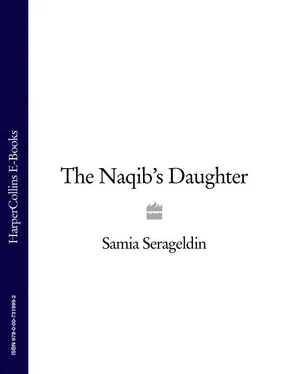1 ...6 7 8 10 11 12 ...18 ‘What trouble, Father?’ Zeinab blurted.
Her father frowned. ‘Learn to control your curiosity, child, or you will be sent back to your nurse.’ He took a long drink of carob juice. ‘It was when we rose to take our leave that the chief general went to Shaykh Sharkawi and kissed him on both cheeks, then with a flourish draped a blue, red and white shawl around his neck. The shaykh immediately removed it and flung it on the ground. “I will not forfeit this world and the next,” he exclaimed. Bonaparte flushed with rage and remonstrated with him through the interpreter. “The commander in chief intends to exalt you by bestowing his attire and emblem on you. If you are distinguished by wearing it, the French soldiers and the people will honour and respect you.” Sharkawi replied: “But our good standing with God and our fellow Muslims will be lost.”’
Her father clapped his hands for his pipe. ‘This infuriated Bonaparte. I tried to soothe him and asked exemption from this measure, or at least a delay in its implementation. Bonaparte retorted: “At least you must all wear the rosette on your chest.”’
‘What is this thing they call a rosette, Father?’
‘It is an emblem made of three concentric colours of ribbon – the same blue, white and red as their flag and their shawl. As soon as the shaykhs left the council, they each in turn, starting with Shaykh Sadat – how that man loves to grandstand before the common folk! – removed the rosette and flung it on the ground, in front of the assembled crowd outside. I had no choice but to follow suit. Shaykh Jabarti told me privately that he does not himself hold that wearing such an emblem is against Islam, particularly when it is imposed and harm can result from disobedience; but he knows that the people hold it to be sacrilege. It will remain to be seen how this matter is resolved. As the proverb goes: If you wish to be obeyed, command that which is feasible.’
‘Mabruk, Shaykh Khalil, congratulations on your appointment to the diwan.’ Zeinab’s mother signalled to the servant to light the apple-scented tobacco in the small clay cup at the top of the glass hookah. ‘Having the ulema and the French on the same footing in the diwan … it’s more than the Mamlukes ever did for the clerics. When does the council meet for the first time?’
‘Next week. We have our work cut out for us in the first session: we have to appoint officials to replace the Mamlukes and their retainers in all the functions they performed. The one stipulation the French laid down was that no member of the Mamluke caste would be allowed to hold any position, official or otherwise. Jabarti told the French the common folk feared no one but the amirs, so they allowed some descendants of the ancient houses to assume certain posts. Elfi Bey’s khatkhuda, Zulfikar, was appointed to be khatkhuda to Bonaparte. But there is another matter of more immediate concern to me … an opportunity to advance my position with the French …’
‘Really, Shaykh Khalil? God be praised!’ Zeinab’s mother leaned in eagerly.
Shaykh Bakri blew rings of apple-scented smoke in the air. ‘The French commandant also announced that Omar Makram, the Naqib, who fled the city, would be replaced as chief of the syndicate of the House of the Prophet. Naturally, they will be nominating a successor …’
‘Oh! Shaykh Khalil! I see where you are going with this: you yourself are of the lineage of the Prophet. God be praised!’
‘Now don’t get ahead of yourself, wife. But I am indeed one of the most prominent, and head of the Sufi guild of the Bakris besides, so it is not out of the question.’
‘There is no one worthier!’
‘But I have many enemies among the ulema who will no doubt undermine my candidacy. If there were a way to consolidate my position with the French …’ He drew Zeinab towards him and looked at her speculatively. ‘A marriageable daughter, now… perhaps an alliance?’
Zeinab spared no more than a moment’s attention to her father’s musings. She twisted the end of her braid in her fingers, waiting for the opening to ask the questions that really piqued her curiosity: Were the commandants handsome? Were there any French ladies in sight? What did they look like? Was it true they walked about unveiled and bare-bosomed?
Nicolas Conté stopped in his tracks momentarily to listen to a street urchin singing his wares. The boy’s soprano reminded him so much of his son Pierrot’s pure soprano when he still sang in the choir that he was cut to the quick with a pang of longing for his son, for the sweet chant of choir boys, in this city where the only choir he heard was that of the muezzins chanting the call to prayers from dawn to dusk.
The urchin’s cry died away in the Cairo air and in two long strides Conté caught up with his companions in the dusty alley. He was brimming with impatience to discover Cairo, finally. Ambassador Magallon had offered to guide him and St-Hilaire to their new accommodations, the mansion commandeered for the Scientific Commission.
‘The mansion you will be occupying is in the Nasiriya district – the name means victory in Arabic – to the south-west of town,’ Ambassador Magallon was saying. ‘You will be taking the house of Hassan Kashif, and the adjoining beys’ palaces and their gardens. An excellent location, I should say, but for the disadvantage of being so far from the Ezbekiah where the generals have made Elfi Bey’s palace their headquarters.’
‘Ah! One wonders if this is entirely by chance?’ Geoffroy raised an eyebrow. ‘I heard General Bonaparte say once that scientists were much like women for gossip and rivalries and squabbling. A fine opinion our general holds of us!’
But Nicolas was absorbed in the street theatre around him. His senses were disoriented by the assault of the unfamiliar, and his eyes needed an interpreter as much as his ears. His first impression of Cairo was overwhelming. The city seemed immense, sprawling and bewildering, a maze of narrow streets and blind alleys; the houses in general – apart from the palaces and mansions of the amirs and notables – turning blind facades and cold shoulders to the street. Most were one or two storeys high, with the exception of the houses in the market, which were narrow and rose two or three storeys above the shops on the ground floor.
Nicolas had never encountered as cacophonous and mixed a city, a veritable Tower of Babel spoken on the street; the people a mixture of races and religions from all over the Ottoman empire and Europe: Turks, Circassians, Egyptians, Bedouin, Moroccans, Italians, Muslim, Copt, Greek Orthodox, Syrian Catholic, Jewish. The men seemed generally well-made and fine-figured, with skin so tanned by the sun as to resemble leather. Women were rare, and veiled in robes from head to foot.
‘There are several of these large covered markets around the city – wikalas, as they are called,’ Magallon explained. ‘Each specializes in a particular kind of trade: dates, fabric, camels, slaves … and they have done so for centuries. Sitt Nafisa’s wikala at Bab Zuweila, for instance, specializes in coffee and spices, since that is where the caravans from Arabia unload their wares.’
‘Ah! Speaking of Sitt Nafisa, Citoyen,’ Nicolas interjected. ‘I had promised my wife to report to her at the earliest opportunity on the interior of the harem, as she is most curious to know how Muslim ladies entertain chez elles . I understand Madame Magallon was one of this lady’s intimates?’
‘It is not a simple matter to arrange an invitation to the harem,’ Magallon demurred. ‘The Oriental idea of home and privacy is very different to ours.’
‘Indeed! Look around you – the houses and doors we pass remain resolutely closed in our faces,’ Geoffroy St-Hilaire gestured broadly to both sides of the street.
Читать дальше












